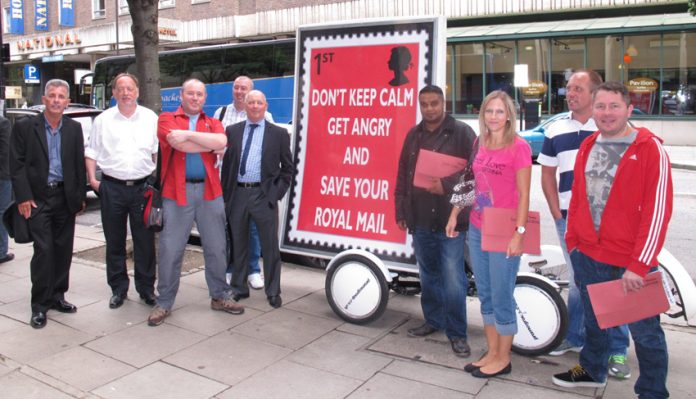
THE Communication Workers Union Policy Forum of over 500 CWU reps in central London yesterday voted unanimously for a national strike ballot of Royal Mail workers unless protections for jobs and services can be secured.
They voted for Recommendation 3: ‘That the CWU will prioritise national negotiations along the policy lines stated.
‘If satisfactory agreements cannot be secured, the union will hold a national industrial action ballot no later than September 2013.
‘The Postal Executive will have discretion to enact the ballot earlier in light of events, the actions of management and progress made.’
The CWU said: ‘If the ballot goes ahead it will include 115,000 postal workers in Royal Mail (excluding Parcelforce and the Post Office) and would be the first ballot for national strike action in Royal Mail since September 2009.’
The full recommendation calls for protection of terms and conditions through ‘explicit commitments from the company for up to ten years’ that ‘Royal Mail would remain an End to End service provider and there would be no break-up of the company or sale of individual functions’.
The CWU is demanding ‘no franchising’ and ‘no outsourcing’, and for ‘all employees to remain directly employed under CWU-negotiated terms and conditions’.
It wants ‘existing job security agreements to remain in place’ and ‘no zero-hours contracts’, ‘no two-tier terms and conditions’ and that ‘the workforce would remain predominately full time with a 75/25 split with measures agreed to monitor this practice.’
Reps also voted for an amendment: ‘In the event of privatisation we will seek protections and assurances, with explicit commitments from the company that will protect our members’ interests in regard to “employee shareholders” contained within Chapter 27-205A of the Growth and Infrastructure Act 2013; which was inserted as an amendment after 205 of the Employment Rights Act 1996.’
Mover Bill Butterworth, Merseyside Amal rep, said: ‘The Growth and Infrastructure Act simply put is another attack on workers by this insidious government.
‘Dave Ward said we won’t tell our members to accept free shares.
‘We have to be explicit on two-tier terms and conditions; say no to employees, and employee shareholders.’
Bristol rep Dave Chapel told delegates: ‘I support the amendment but with reservations.
‘This forum is in effect an anti-privatisation rally.
‘Right now we need to be saying privatisation, no way.
‘Amendments that say what happens if we do get privatised are inappropriate.
‘We need to be saying no way is this industry going to be privatised.’
Reps also voted for amendments calling to bring Romec and Quadrant joint Royal Mail/Balfour Beatty ventures back in house, and that any agreement on pay, pensions, terms and conditions be put before a recall CWU/Policy Forum.
Dave Ward, CWU deputy general secretary, speaking to the amended recommendation, said: ‘We want negotiations. Strikes are not the objective but I do not believe we are going to get a solution without an industrial action ballot.
‘We are going to call on our members on the day of the strike to come to London for the biggest-ever demonstration of postal workers this union has seen,’ he added to applause.
Ward said management were split on privatisation, adding: ‘We ask Unite to come and join us and get those managers out on the demonstration.’
He said: ‘We have to say no cooperation with Royal Mail savings.
‘It is entirely possible to stop the sale, the government feel what this union is doing.
‘If they go ahead, maybe they’ll sell only part of the company. The next election can reverse the policy.
‘The essence of the report is about an industrial fight.
‘We’ve set out what we want in the way of a legally enforceable agreement.’
He stressed: ‘What’s not in the agreement are the pensions proposals; they’re not acceptable.
‘And we’re not coming back to a pay deal that’s linked to pension changes.
He concluded: ‘We are not interested in a one-year or a two-year guarantee, we want a ten years guarantee.
‘We are challenging Royal Mail on all fronts, we are challenging the government on all fronts.’